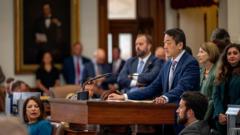On July 3, 2025, the House of Representatives began voting on President Trump's major domestic policy bill following intense negotiations among Republicans to secure support for the legislation. Speaker Mike Johnson led the charge as the party coalesced around the bill despite substantial pushback from conservative factions within Congress. The sweeping proposal, titled the "One Big Beautiful Bill," aims to implement massive tax cuts totaling approximately $4.5 trillion, bolster military funding, and enforce stringent cuts to Medicaid and food assistance programs.
During a contentious session, Johnson emphasized the potential benefits of the bill, insisting it would enhance safety and prosperity for Americans. However, the road to the vote was tumultuous; Democrats positioned themselves as staunch adversaries. Representative Hakeem Jeffries delivered an exceptionally long speech lasting nearly nine hours, characterizing the bill as a harmful measure that would jeopardize essential services for vulnerable citizens. His impassioned address included personal accounts of those who could face adverse effects due to the proposed cuts.
With only a slim margin in the House, the Republicans were under pressure to navigate dissent from within their ranks. After hours of debate, moderate Republicans expressed concerns over the bill's potential impact on constituents, particularly regarding Medicaid. These intra-party disputes manifested in a wavering commitment to support the bill, with figures like Representative Brian Fitzpatrick of Pennsylvania defying party lines by voting against it. This development illustrated the rift between traditional conservatives wary of excessive cuts to social programs and a more radical, fiscally adventurous faction.
Democrats strategically seized upon the party's discord to rally public sentiment against the bill in the lead-up to the midterm elections. Tension in the House peaked as the tight vote approached, revealing the complexities of the political landscape as the GOP attempts to assert its agenda amidst critical voter and party dynamics. As Congress presses on towards a final outcome, the eyes of the nation are focused on how this legislative battle will impact the electorate and the broader political landscape heading into the midterms.
During a contentious session, Johnson emphasized the potential benefits of the bill, insisting it would enhance safety and prosperity for Americans. However, the road to the vote was tumultuous; Democrats positioned themselves as staunch adversaries. Representative Hakeem Jeffries delivered an exceptionally long speech lasting nearly nine hours, characterizing the bill as a harmful measure that would jeopardize essential services for vulnerable citizens. His impassioned address included personal accounts of those who could face adverse effects due to the proposed cuts.
With only a slim margin in the House, the Republicans were under pressure to navigate dissent from within their ranks. After hours of debate, moderate Republicans expressed concerns over the bill's potential impact on constituents, particularly regarding Medicaid. These intra-party disputes manifested in a wavering commitment to support the bill, with figures like Representative Brian Fitzpatrick of Pennsylvania defying party lines by voting against it. This development illustrated the rift between traditional conservatives wary of excessive cuts to social programs and a more radical, fiscally adventurous faction.
Democrats strategically seized upon the party's discord to rally public sentiment against the bill in the lead-up to the midterm elections. Tension in the House peaked as the tight vote approached, revealing the complexities of the political landscape as the GOP attempts to assert its agenda amidst critical voter and party dynamics. As Congress presses on towards a final outcome, the eyes of the nation are focused on how this legislative battle will impact the electorate and the broader political landscape heading into the midterms.




















